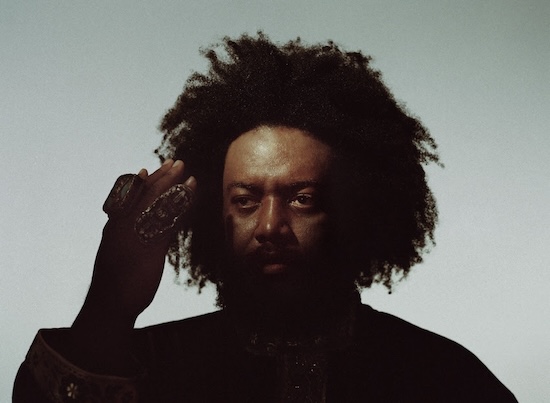With the birth of his daughter, Kamasi Washington now fears his mortality. The American jazz musician and bandleader sees the ‘horizon’ of his life approaching and his daughter living on after him. And so, unlike, his previous albums, Fearless Movement sounds cemented in earthy, emotional concerns. There’s real anxiety and euphoria at work here, accompanied by shifting grooves. It’s probably his most dense work to date, but getting lost in it feels exciting rather than perplexing.
Fearless Movement’s palette is eclectic and bright. It often reminds me of Herbie Hancock in its moments of feverous jazz fusion, which for Washington is channelled through the claustrophobia and uncertainty of the Covid pandemic. Synth textures pop out against flutes and furtive saxophone melodies. It’s still a sprightly sounding record, though – perhaps because it’s largely inspired by Washington’s daughter who features as a blur on the album’s cover, in front of a large-scale abstract expressionist painting. While ‘our children are the future’ is a well-used expression (often without elaboration), Washington celebrates the excitement of the world through his daughter’s eyes and her first ventures into musical expression.
While this album is packed with ideas and cameos, it mostly feels seamless. The cameos aren’t just there for the sake of it, and they sit right for each track. Its acid-tinged funk and fusion makes the album feel like a bright merry-go-round of influences. Washington makes it make sense to find Andre 3000 next to a track featuring George Clinton and D Smoke. You can also find the pulse of Steve Reich’s minimalist ‘Electric Counterpoint’ scattered through tracks like ‘The Visionary’ and ‘Dream State’, giving the album a fluttering organic quality. And as Washington says, the core musical idea of ‘Asha The First’ came about from his daughter’s first musical explorations on the piano.
‘Asha The First’, is around seven minutes long but doesn’t feel over-egged. Featuring collaborations with Thundercat, Taj Austin and Ras Austin, the track opens with a chorus of “Now my heart is free / staring back at me / futures past I see / life shines from the tree” before jolting into a bass solo and cascading synths. An obvious comparison here would be the guitar work on Flying Lotus’ You’re Dead!, but Washington’s production is much more tight-knit-band-in-a-jazz-club than You’re Dead!’s out-of-body experience. ‘Asha The First’ then shifts into a more urgent rap on lost futures, pollution, the lack of a perfect world, “the only way to predict the future is to create it”, and how the education system destroys creativity. It’s here in the lyrics, then, that we see the core political and personal inspirations for Washington’s album take a central role.
In terms of politics, I can see parallels between Washington and Don and Moki Cherry’s approach to pedagogy, the idea of ‘life as art’ as something which applies to children as much as it does to adult artists. There’s also something in the psychedelic visuals of multidisciplinary artist Moki Cherry’s ‘art life’, her textiles, ceramics, and woodworking, that has a similar generousness and diversity to Washington’s sound. As Neneh Cherry (Moki’s daughter) says about growing up in the family home in Crack:
‘If you can imagine it you can create it and you can make it part of your world… . For example, making loads of the things around the house like furniture, clothes, growing vegetables, everything like that also reflects on my ideas of self-sufficiency. And making your art part of your lifestyle, which I think I still, in my own way, definitely value very much’.
Artists like Don and Moki Cherry and Kamasi Washington understand the idea of pedagogy and musical play as having a political significance. It’s like that essential feminist argument of the domestic and the political being intertwined, when historically it’s been seen as something separate.
You can look at ‘the personal as political’ as something dynamic and constantly shifting rather than simply describing how the political supervenes onto the personal. The play of adults and children both reflect the ideas of wider society, but there’s capacity there to challenge them through experimentation and disruption. Play allows for a response to the pushes and pulls of one’s situation using creativity and useful failures that uncover new paths and new ways of existing together. Mistakes can be a means to discover new creative vocabularies or push the boundaries of what music can be. There are no neatly categorisable ‘failures’.
The musical language of Kamasi Washington’s latest doesn’t just reflect child’s play however – it maintains a strangely complimentary dynamic between this and a surface sophistication. It’s the response of an adult to their daughter’s exploration. He’s reminded of that initial self-discovery in sound, but it’s impossible for him to fully return to. Washington’s sophistication comes through in the voicing of instruments, pacing and the deliberately wonky track structures. But even reaching these ideas must have come about through breaking the rules of genre, which Washington’s jazz fusion approach allows him to do.
Fearless Movement feels most successful on Washington’s most energetic tracks, where the vitality of the instrumentation comes together with political messaging and psychedelic observations. While this album is undoubtedly a little top-heavy in terms of its cameos and most sonically inventive tracks, his saxophone playing shows urgent vitality throughout.



